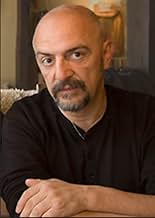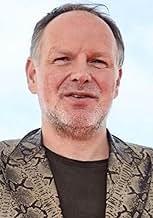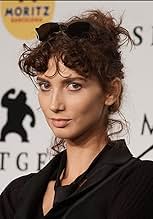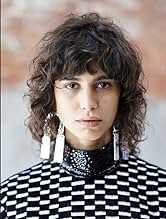Lux Æterna
IMDb RATING
6.2/10
8.3K
YOUR RATING
Two actresses, Béatrice Dalle and Charlotte Gainsbourg, are on a film set telling stories about witches - but that's not all. 'Lux Æterna' is also an essay on cinema, the love of film, and o... Read allTwo actresses, Béatrice Dalle and Charlotte Gainsbourg, are on a film set telling stories about witches - but that's not all. 'Lux Æterna' is also an essay on cinema, the love of film, and on-set hysterics.Two actresses, Béatrice Dalle and Charlotte Gainsbourg, are on a film set telling stories about witches - but that's not all. 'Lux Æterna' is also an essay on cinema, the love of film, and on-set hysterics.
- Awards
- 1 nomination total
- Director
- Writer
- All cast & crew
- Production, box office & more at IMDbPro
Featured reviews
First off, I'm quite a Gaspar Noé fan, and I have watched every movie since "I stand alone" - I liked every single one of them, and especially Climax really surprised me with how good it was.
This movie however leaves me with very mixed feelings. 90% of the movie consists dialog which is either meaningless or leaves alot of room for interpretation, but, in any case, wasn't very entertaining to watch. The other 10% make anyone familiar with Noé's work instantly recognize his trademark visuals. These 10% are really painful to watch, but not for the reasons you might expect from a "classic" Noé movie. In the end, the movie left me pretty unsatisfied. The visuals were pretty interesting at times, yes, and would have been perfect for a music video, but they don't save save the movie from feeling dull.
I would still recommend it for fans of this director, as it is definitely an unusual movie, just don't expect anything mindblowing or truly disturbing!
This movie however leaves me with very mixed feelings. 90% of the movie consists dialog which is either meaningless or leaves alot of room for interpretation, but, in any case, wasn't very entertaining to watch. The other 10% make anyone familiar with Noé's work instantly recognize his trademark visuals. These 10% are really painful to watch, but not for the reasons you might expect from a "classic" Noé movie. In the end, the movie left me pretty unsatisfied. The visuals were pretty interesting at times, yes, and would have been perfect for a music video, but they don't save save the movie from feeling dull.
I would still recommend it for fans of this director, as it is definitely an unusual movie, just don't expect anything mindblowing or truly disturbing!
7 months after its premiere in Cannes (which I attended), I can't believe there is still no review of Lux Aeterna, so here is mine:
I think this film is admirable in many ways although not devoid of flaws, the main one being that for the nth time, Noé pulls the same expectable tricks with colorful lighting, flickering images and references to his classics (even just the title, "Lux Aeterna" is the György Ligeti eerie choir piece used in "2001: A Space Odyssey"), etc. So that does get a little unimaginative, especially since the atmosphere and development are very close to his latest long feature, "Climax".
That said, everything else is interesting. From the Dalle / Gainsbourg improvised dialogue (made hilarious by Dalle's very personal way of saying things - let's hope that won't get lost in translation) to the creative ways in which Noé uses the screen space. I couldn't stress this enough: *This Must Be Watched In A Movie Theater* ! Although I do enjoy smaller screens, I'm afraid a small screen won't cut it with this one. As usual with Noé, the experimental elements are present and the big screen is a must in order to enjoy them fully.
Many references are made throughout the film to Carl Dreyer's classic "Vredens Dag" from 1943, also using footage from it. It does serve a purpose but cannot really be discussed without spoiling.
I believe many interpretations of the film are possible. From mysogynistic to feminist. I'm definitely going with the latter. The end scene is intense in symbolism, deafening sound, flickering visuals and a creative use of the screen. If you suffer from epilepsy: STAY AWAY. As usual, Noé tries our patience and is into trying to shock us - but that's getting a bit old. Nothing gory though, so the faint of heart can watch. The camera flies from room to room as the crescendo builds up progressively until smothering hysteria. The film only lasts 50mn but it wouldn't necessarily have made more sense to make it any longer.
This is also definitely a film about film-making and how things go, on and off set. It's a film about actresses - how some can impose their strength or choose to go with what is asked of them.
This film will divide. Some will see it as arty, vaccuous and pointless. Others will find depth and meaning in it, but not necessarily the same meaning. I believe this is the best Noé film in a long time. Overall better than "Climax" or "Love". If you can get past Noé's antics, it is not only enjoyable, it is mostly an undeniable breath of fresh air in contemporary cinema.
I think this film is admirable in many ways although not devoid of flaws, the main one being that for the nth time, Noé pulls the same expectable tricks with colorful lighting, flickering images and references to his classics (even just the title, "Lux Aeterna" is the György Ligeti eerie choir piece used in "2001: A Space Odyssey"), etc. So that does get a little unimaginative, especially since the atmosphere and development are very close to his latest long feature, "Climax".
That said, everything else is interesting. From the Dalle / Gainsbourg improvised dialogue (made hilarious by Dalle's very personal way of saying things - let's hope that won't get lost in translation) to the creative ways in which Noé uses the screen space. I couldn't stress this enough: *This Must Be Watched In A Movie Theater* ! Although I do enjoy smaller screens, I'm afraid a small screen won't cut it with this one. As usual with Noé, the experimental elements are present and the big screen is a must in order to enjoy them fully.
Many references are made throughout the film to Carl Dreyer's classic "Vredens Dag" from 1943, also using footage from it. It does serve a purpose but cannot really be discussed without spoiling.
I believe many interpretations of the film are possible. From mysogynistic to feminist. I'm definitely going with the latter. The end scene is intense in symbolism, deafening sound, flickering visuals and a creative use of the screen. If you suffer from epilepsy: STAY AWAY. As usual, Noé tries our patience and is into trying to shock us - but that's getting a bit old. Nothing gory though, so the faint of heart can watch. The camera flies from room to room as the crescendo builds up progressively until smothering hysteria. The film only lasts 50mn but it wouldn't necessarily have made more sense to make it any longer.
This is also definitely a film about film-making and how things go, on and off set. It's a film about actresses - how some can impose their strength or choose to go with what is asked of them.
This film will divide. Some will see it as arty, vaccuous and pointless. Others will find depth and meaning in it, but not necessarily the same meaning. I believe this is the best Noé film in a long time. Overall better than "Climax" or "Love". If you can get past Noé's antics, it is not only enjoyable, it is mostly an undeniable breath of fresh air in contemporary cinema.
This was a movie that when I saw it was from Gaspar Noé and coming to the Gateway Film Center, it had my attention. Reading through the synopsis and checking the genres, I thought that it could be horror or at least adjacent. It also featured Béatrice Dalle and Charlotte Gainsbourg, I was in.
What I should say next is that this isn't a horror film. It does have elements though. This movie is about making a movie. Dalle and Gainsbourg play themselves. The first part is them chatting about different movies and experiences they've been on. They are both in this production that is borrowing from Haxän, which is a documentary/dramatization of witchcraft throughout the ages. This moves into a surreal situation to end the movie as they film the scene with Gainsbourg, Abby Lee and another actor as they're 'burned' at the stake for the movie.
The movie has a feeling of dread. We see that the production of the movie is troubled. Dalle is the elder actor and she butts heads with the director who in turn wants her off the project. He takes this to the executive producer. We have a guy who is trying to pitch an idea of a role in his feature film debut to Gainsbourg and Lee. This annoys both as it is unprofessional. Gainsbourg learns a horrific thing might have happened to her daughter and she is torn what to do. The tension just builds until the climax. It is interesting as well since this runs 51 minutes.
This movie does get some of that Noé flair. He is a bit over the top at times, but I respect his style. The acting is natural as playing caricatures of themselves. The visuals here are amazing. That is the biggest take away for me. I enjoy the message we are conveying here both on the surface and underneath. This won't be for everyone though. This is arthouse. It is short, so keep that in mind. It is an interesting ride for sure.
My Rating: 8 out of 10.
What I should say next is that this isn't a horror film. It does have elements though. This movie is about making a movie. Dalle and Gainsbourg play themselves. The first part is them chatting about different movies and experiences they've been on. They are both in this production that is borrowing from Haxän, which is a documentary/dramatization of witchcraft throughout the ages. This moves into a surreal situation to end the movie as they film the scene with Gainsbourg, Abby Lee and another actor as they're 'burned' at the stake for the movie.
The movie has a feeling of dread. We see that the production of the movie is troubled. Dalle is the elder actor and she butts heads with the director who in turn wants her off the project. He takes this to the executive producer. We have a guy who is trying to pitch an idea of a role in his feature film debut to Gainsbourg and Lee. This annoys both as it is unprofessional. Gainsbourg learns a horrific thing might have happened to her daughter and she is torn what to do. The tension just builds until the climax. It is interesting as well since this runs 51 minutes.
This movie does get some of that Noé flair. He is a bit over the top at times, but I respect his style. The acting is natural as playing caricatures of themselves. The visuals here are amazing. That is the biggest take away for me. I enjoy the message we are conveying here both on the surface and underneath. This won't be for everyone though. This is arthouse. It is short, so keep that in mind. It is an interesting ride for sure.
My Rating: 8 out of 10.
While watching the movie You are definitely feeling the stress on the set. If you want to watch a regular cinema and if you don't know who is Gaspar Noe you might say "what was that ? What happened ?". As in the previous films of Gaspar you are not just standing there and watching the movie you feel what characters feels.
The "Lux Aeterna" (18+) is one more cinematic experiment from Gaspar Noé. Noe gained the worldwide fame in 2002, thanks to the scandalous film "Irreversibility" with Monica Bellucci and Vincent Cassel.
"Lux Aeterna" grew out of a collaboration between Saint Laurent and Gaspar Noé, the master of light and audience reactions, it is a surreal and hysterically beautiful narrative of a day on the set of a film about the Inquisition in the underground aesthetics of the 1990s. The shimmering light and quotes from Dostoevsky, Godard, Fassbinder and other iconic figures add contrasts to the film.
Two icons of French cinema of the last decades, Beatrice Dalle and Charlotte Gainsbourg, are the driving mechanisms of the film. At first, they improvise in the dialogue, where they are ironic and exaggerative, but they tell about the creative underside of almost any film or production, and later they heat up emotional tension to the level of the atrocities of the Inquisition or hellish cauldrons. The aesthetic is amazing: crosses and bonfires, Charlotte in a Saint Laurent dress and the insane energy of Beatrice, covering even the madness of light and music at the end of the film. Beatrice is the witch in this story: charismatic, bright, even weird and uncomfortable for others, and the film within the film is her brainchild, which others are trying to appropriate.
The film turned out to be stylish and a bit provocative: about fashion and its victims, about vices and the fact that not everything is so simple with them, and, finally, about human selfishness. A neon beam pierces the "Lux Aeterna" with the truth that witches have a hard time even in the 21st century, because the crowd is always ready to lynch.
"Lux Aeterna" grew out of a collaboration between Saint Laurent and Gaspar Noé, the master of light and audience reactions, it is a surreal and hysterically beautiful narrative of a day on the set of a film about the Inquisition in the underground aesthetics of the 1990s. The shimmering light and quotes from Dostoevsky, Godard, Fassbinder and other iconic figures add contrasts to the film.
Two icons of French cinema of the last decades, Beatrice Dalle and Charlotte Gainsbourg, are the driving mechanisms of the film. At first, they improvise in the dialogue, where they are ironic and exaggerative, but they tell about the creative underside of almost any film or production, and later they heat up emotional tension to the level of the atrocities of the Inquisition or hellish cauldrons. The aesthetic is amazing: crosses and bonfires, Charlotte in a Saint Laurent dress and the insane energy of Beatrice, covering even the madness of light and music at the end of the film. Beatrice is the witch in this story: charismatic, bright, even weird and uncomfortable for others, and the film within the film is her brainchild, which others are trying to appropriate.
The film turned out to be stylish and a bit provocative: about fashion and its victims, about vices and the fact that not everything is so simple with them, and, finally, about human selfishness. A neon beam pierces the "Lux Aeterna" with the truth that witches have a hard time even in the 21st century, because the crowd is always ready to lynch.
Did you know
- TriviaParamedics were waiting outside of the premier at Cannes Film Festival, in case audience members would become sick or faint during the screening.
- Crazy creditsThe end credits were stylized Latin script used in the Middle Ages (e.g. with the letter "v" instead of "u") - This is how the title itself is written: Lvx Æterna. All the actor names included first names only, no family names. As the director himself said, in the times when Latin language was used, people didn't use surnames (family names), so he decided to put only first names in the end credits.
- ConnectionsFeatures La Sorcellerie à travers les âges (1922)
- How long is Lux Æterna?Powered by Alexa
Details
Box office
- Gross US & Canada
- $50,027
- Opening weekend US & Canada
- $8,945
- May 8, 2022
- Gross worldwide
- $323,829
- Runtime51 minutes
- Color
- Aspect ratio
- 1.33 : 1
- 2.35 : 1
Contribute to this page
Suggest an edit or add missing content



![Bande-annonce [OV]](https://m.media-amazon.com/images/M/MV5BMWM2MzRmZmUtY2YxYy00ZTNhLTkwMDgtYWM0NDA0NDlhMDQzXkEyXkFqcGdeQXRyYW5zY29kZS13b3JrZmxvdw@@._V1_QL75_UX500_CR0)

































